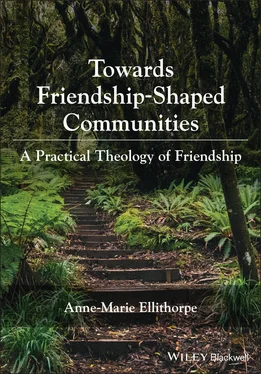Friendship was central to the twentieth century civil rights movement within the United States. For Martin Luther King Jr., the goal of nonviolent activism was ultimately to win the understanding and friendship of opponents. 100 Here it is worth noting that King drew significantly on Nygren’s work on agapē , critiqued above, to advocate for nonviolent resistance that intentionally seeks the good of white oppressors. He did not, however, follow Nygren’s emphasis on love as uncalculating and unmotivated. 101 Rather, King’s developed definition of love “combines dimensions of equal regard, mutual love, and delivering love, in addition to echoes of Nygren’s sacrificial love.” 102 These themes of equal regard and sacrifice will be further explored within Chapter 8.
King’s understanding of love contributed to him seeing the other as friend and neighbor rather than as enemy. 103 His work took place within contexts where friendship between white and Black were difficult to conceive, due to racist attitudes, oppression, and the use of violence to generate fear. While personal friendships within Black communities made sense, friendships between Black and white was for many inconceivable. Further, where attempts at such friendships did take place, radical inequalities could contribute to such relationships being sources of pain for those with less power. 104 Nevertheless, the attitudes and actions that King advocated for are essentially those of civic friendship. King expressed an ideal that had the potential to be transformative, as he called America to return to its founding principles, while strategically adapting his message for a variety of audiences. 105
King did not lead the civil rights movement alone. Rather, he was one of a tight group of friends, including John Lewis, James Lawson, Andrew Young, and C.T. Vivian, who collaboratively strategized and coordinated protests. 106 As with each of these friends, King accomplished what he did because of and through the friendships that supported him. Another friendship that sustained King was with Jewish theologian Abraham Joshua Heschel, fellow civil rights activist and lecturer. Susannah Heschel describes her father and King as being brought together by the biblical prophets with their “rhetoric of indictment and hope, irony and promise, but above all, the prophetic understanding of God.” 107 Their friendship was further fostered through working together on various projects. The transformative and Spirit-filled friendships that King called for were consistent with his experience of what these various friendships gave him personally.
Friendship was also vital to the struggle against apartheid in South Africa, sustaining South African activist Nelson Mandela and other African National Congress colleagues through long years of imprisonment and separation from family. The relationship between the American civil rights movement and the South African anti-apartheid movement was characterized by gestures of friendship. 108
Themes of solidarity and friendship have captivated the imagination of some theologians. Gustavo Gutiérrez, the Peruvian founding father of liberation theology, advocates for solidarity with the poor through friendship with people whom one knows and loves, along with compassion for those who share their unjust situation. Solidarity cannot be abstract; it cannot simply be with a class of people. 109 Nor can solidarity ultimately be undertaken by isolated individuals. Rather, the way of solidarity is a community endeavor to be undertaken with and by the entire church. 110 Solidarity is not a duty or obligation, but rather an outworking of the love that exists between equals. “It is a work of concrete, authentic love for the poor that is not possible apart from a certain integration into their world and apart from bonds of real friendship with those who suffer despoliation and injustice.” 111 As such, solidarity is characterized by affection and tenderness.
Friendships across racial barriers are a statement against ethnic privilege and a challenge to various assumptions. Yet such friendships have been, and continue to be, challenged by paternalistic attitudes, requiring the learning of difficult practices such as giving up power, listening, and not speaking for the other. Further, as becomes evident in I Bring the Voices of My People , the terminology of love and friendship can and has been misused. As Chanequa Walker-Barnes articulates a womanist vision for racial reconciliation, she critiques the terminology of love and friendship as far too often being used to “manipulate victims of oppression into silent complicity with their quotidian experiences of racism, including those that occur in relationship with White Christians who claim to be pursuing reconciliation.” 112 Walker-Barnes asserts that the posture needed for racial reconciliation is not that of friendship where people run towards one another, but rather that of solidarity, with people collaboratively pursuing a greater objective. When it comes to racial reconciliation, this greater objective is identified as threefold: “the destruction of white supremacy, the healing and repair of the historical wounds of racism, and the establishment of a racially just society.” 113 Walker-Barnes notes that systemic oppression both shatters the psyche of the oppressed and wounds the soul of the oppressor. Being an agent of oppression inflicts moral injury, requiring moral repair, “albeit of a different sort than that which is necessary for the victims of oppression.” 114
Friendship has also been important to the struggle against sexual oppression. The rediscovery of friendships that nourished women, both in the past and the present, was an important aspect of feminist scholarship in the 1970s and 1980s. Feminist scholars from a variety of disciplines noted a cultural tendency to trivialize women’s relationships. 115 One feminist response was to make visible the political nature of women’s friendships. In Women Talk , Jennifer Coates identifies female friendship conversations as non-trivial and as providing a focus for the discussion and re-evaluation of social norms along with the construction and maintenance of personal identity. 116
Bridging philosophy and politics, Jacques Derrida’s Politiques de l’amitié , translated into English as The Politics of Friendship , examines the political history of the idea of friendship. He identifies a basic tension between unity and difference, and advocates for taking seriously the place and voice of the other . His comprehensive contemporary analysis expresses concern about the exclusion of women from the political, along with the phallocentricity of the history of the philosophy of friendship. When, Derrida asks, “will we be ready for an experience of freedom and equality that is capable of respectfully respecting that friendship which would at last be just…?” 117
In the early twenty-first century, friendship is increasingly being invoked academically by political theorists as a potential model to illuminate issues such as citizenship and international relations. 118 Danielle Allen advocates for a “citizenship of political friendship” 119 that promotes confidence rather than fear in talking to strangers and acknowledges our shared responsibility for the shape of life within our communities. 120 Sibyl Schwarzenbach suggests that incorporating values of friendship into the political, in the form of civic friendship, may contribute towards determining “the limits of legitimate freedom and equality” within the context of a genuine democracy. 121 Political philosopher Astrid H.M. Nordin argues that the focus on Western experience and thought when it comes to friendship has both marginalized friendship from the discipline of international relations and limited its decolonizing potential. 122 Nevertheless, she asserts, friendship can contribute to a rethinking and decolonizing of international relations and related disciplines. 123 Friendship provides an important perspective for considering political relationships both locally and globally, yet this most important relationship when it comes to politics has not been adequately explored; there is plenty of scope for more politically directed research on friendship. 124
Читать дальше












